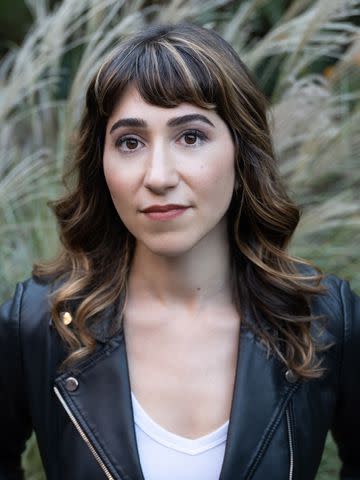Mom Still Breastfeeds Her Son at 4 Years Old — and Has No Plans to Stop: It 'Works for Us' (Exclusive)
"We haven't stopped breastfeeding because breastfeeding works for us," Yarrow tells PEOPLE

Beowulf Sheehan
Allison Yarrow has loved the connection she's formed with her son through breastfeeding — and four years later, she doesn't have plans to stop anytime soon.
The journalist and author of Birth Control: The Insidious Power of Men Over Motherhood hasn't stopped breastfeeding her 4-year-old son because, for her, the act of breastfeeding has a symbiotic nature.
"We haven't stopped breastfeeding because breastfeeding works for us," Yarrow tells PEOPLE. "It's something we do once or twice a day. Sometimes it happens more than that if he's hurt or sick, but it is a way that we connect and communicate with each other."
According to the World Health Organization, babies should initiate breastfeeding within the first hour of birth and be exclusively breastfed for the first six months of their lives. Babies should be breastfed on demand from 6 months to "up to 2 years of age or beyond."
Never miss a story — sign up for PEOPLE's free daily newsletter to stay up-to-date on the best of what PEOPLE has to offer, from juicy celebrity news to compelling human interest stories.

Beowulf Sheehan
The American Academy of Pediatrics reflected this recommendation in June 2022, saying that they support continued breastfeeding, along with complementary foods introduced at six months, as long as it's "mutually desired for 2 years or beyond."
It's not just the communication benefits Yarrow enjoys through breastfeeding — she claims there are several advantages to breastfeeding longer. "The research shows that breastfeeding can reduce breast and ovarian cancers. The hormone oxytocin is released when you breastfeed, so it actually feels good."
"It's a way of connecting. And I don't think I would still be doing it if I didn't enjoy it. I wouldn't be just sacrificing myself at this stage. My 4-year-old has other food, right? He's not coming to me for food."
The Mayo Clinic echoes Yarrow's claims, writing that breastfeeding is associated with small neurodevelopmental outcomes in children, but is also "associated with a reduction in acute infections as well as chronic adult conditions like obesity, cancer, heart disease and allergies."
"We still breastfeed because it's a way to connect with each other. We feel good. It's intimacy. It's looking into each other's eyes. It's cuddling. It's having a physical connection. And that strengthens our connection in general," Yarrow adds.
Though Yarrow appreciates the benefits of continuing to breastfeed her 4-year-old, she says it can often be taboo in American culture to breastfeed children past the age of 2.
"Our culture really doesn't support women doing things with their bodies that they want to be doing, so that certainly extends into breastfeeding," says Yarrow. "There's really poor research about extended breastfeeding. There isn't a lot of it."

Getty
"And women and people who give birth are really hampered in their quest to breastfeed after their babies are born. We know that the majority of people who give birth want to breastfeed, but most don't even meet their own breastfeeding goals because accessing lactation support is incredibly difficult."
"Often it's not covered by insurance or Medicaid, and people have to pay out-of-pocket and find somebody to support them in this way when they're already very vulnerable recovering from childbirth and caring for a newborn."
When it comes to any challenges with breastfeeding, Yarrow says the pros outweigh the cons. "It's actually not very much of a commitment. I mean, it's just a few minutes a day, if that, and it's something I want to be doing too."

Getty
"But I'm a human being, I have limits. Sometimes I want to give someone a hug and sometimes I don't want to give someone a hug, and the same goes for breastfeeding. And if I don't want to, I just say no. So I'm also teaching him boundaries," she says.
"It's mostly something we now do at home, and I am very open about still breastfeeding...with my family and friends, with my neighbors and his preschool teachers," Yarrow says of her parameters. "People are aware of it because I find that it's really important to normalize this and to make it known that it's absolutely up to mothers and their kids what they want to do in general, but certainly around something like breastfeeding."
Breastfeeding can also differ from child to child. Yarrow says that although her youngest son still enjoys it, she stopped breastfeeding both of her other kids before age 2. Asked if she's seen differences in her son who breastfeeds versus her other kids, she's unsure.

Chin-Yee Lai
"My son who I breastfeed is a very cuddly, physical guy. He's [got] very intense feelings, but I don't know if...it's kind of like a chicken or egg thing. I don't know if he's sort of more cuddly at this stage than his siblings because of that breastfeeding or if we are breastfeeding longer because he internally just has this need to physically connect that's more pronounced than it was with my other kids at their age."
That being said, Yarrow says she has no plans to stop anytime soon. "I don't have any parameters or plans to stop breastfeeding him," she tells PEOPLE of her son. "Sometimes I think to myself, maybe when he goes to kindergarten, that seems like that would be a good time, but that feels like a very kind of socially imposed deadline."
"This is a relationship. Like any other relationship, there are two participants in this relationship. And so any decisions that we make around this intimacy that we share will be a decision that we make together."
Yarrow expands upon her choice to keep breastfeeding, as well as other topics related to pregnancy and childbirth, in her book Birth Control: The Insidious Power of Men Over Motherhood, available now.
For more People news, make sure to sign up for our newsletter!
Read the original article on People.


